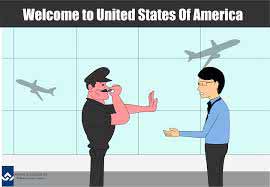Reasons Why You Could Be Refused Entry to the U.S.

There are various reasons as to why an individual might be denied access into the U.S. This is due to the increase in boarder security services due to past incidents. You can be denied entry due to obvious reasons or reasons you may not understand.
Some Reasons include:
- if you have previously been in the U.S. and were caught working illegally
- if you are suspected of being an intended immigrant (plan on staying longer than you are welcome)
- if you have ties to terrorist or criminal organizations
- if you have a criminal record
- if you have a communicable disease
- if you have a physical or mental disorder that makes you harmful to others
- if you are a drug abuser
- if you were previously removed of deported from the U.S.
- if you have violated immigration laws or committed immigration fraud

These are some of the most obvious reasons to be denied entry into the U.S. However, you may also be denied under other less obvious circumstances. For example, tourist visitors must have enough money to support themselves during their stay, if they do not it is assumed that they will attempt to find employment which is illegal. Otherwise, the tourist can have a sponsor that states that they will take care of their expense while they are in the U.S. then funds should not be a problem. In addition to this, tourist visitors must show that they have significant ties to their home country, this shows the likelihood of this person leaving. In both of these situations, it is up to the individual to convince the officer that they will abide by the terms of their visa. All in all there are many obvious reasons as why a person might be denied entry into the U.S., but there are also many not so obvious reasons for this as well.
If you feel that you have been denied entry to the U.S. for no reason at all. You have the option of submitting a request for redress through the Department of Homeland Security’s Travellers Redress Inquiry Program. All details must be included, such as time and place of arrival, reason for denial of admission, and any evidence you have that led you to believe that you were denied for no apparent reason and reasons as to why you should have a decision to admit you into the U.S. Your full name, date of birth, and contact information such as an address and phone number are also necessary.
Denied Entry to the U.S. Due to a Criminal Record
Criminal inadmissibility is one of the most common ways individuals are denied entry to the U.S. This means that you have been convicted of multiple crimes before, certain crimes like drug trafficking or prostitution, or crimes of moral turpitude.
Crimes of Moral Turpitude: refers to conduct that is ‘vile, depraved, contrary to social standards and done with a reckless, malicious, or evil intent‘. This can be interpreted and applied to various offences from common assault to drug offences.
However, this is usually related to the following crimes:
- controlled substance traffickers
- conviction of two or more offences with a combined sentence of 5 or more years
- prostitution or commercialized vice
- individuals involved in serious criminal activities but have asserted immunity from prosecution
In a lot of cases, a criminal record will result in denied entry. Nevertheless, there are exemptions from this. Some crimes are not considered crimes of moral turpitude. This just means that the individual has committed one crime of moral turpitude and has paid their dues to society and is not a risk anymore.
In order for an individual to be granted access to the U.S. with a criminal record, the individual must have:
- committed the crime when he/she was 18 years of age or younger
- committed the crime more than 5 years prior to the date of application for a visa
- committed a crime that did not exceed one year of imprisonment
- been convicted of a crime, but was not sentenced to imprisonment for more than 6 months

In conclusion, most individuals with a criminal record are denied entry to the U.S. This means that the individual has been convicted of multiple crimes before, certain crimes like drug trafficking or prostitution, or crimes of moral turpitude. However, there are exemptions and some individuals can be granted access to the U.S. even with a criminal record. This just means that the individual has committed one crime of moral turpitude and has paid their dues to society and is not a risk anymore. This is only possible under certain circumstances mentioned above.
Do I Need A Waiver?
A waiver is an application to go from inadmissible to admissible. In other words, it is an application for a waiver of inadmissibility. There are three criteria for a waiver application: the risk of harm to society if the applicant is admitted, the seriousness of the applicants prior violation(s) of immigration or criminal law, or the nature of the applicants reasons for seeking entry. Basically, anyone who was denied entry to the U.S. for any of the above reasons, from not having the proper amount of funds to having multiple criminal offences that are considered to be crimes of moral turpitude, has the option to apply for a waiver of inadmissibility.
If a waiver is granted, then the individual will be able to entry the U.S. even though they have previous wrong-doings of some sort. For the most part, waivers that are issued are valid for a 5 year period. This is at the discretion of an immigration officer and the waiver might be issued for a shorter period of time. The individual must present the valid waiver upon every entry into the U.S. during the validity of the waiver.
Therefore, a waiver is the difference between inadmissible and admissible. An application to waive inadmissibility helps people who are inadmissible enter the U.S. for a certain period of time. It does not waive inadmissibility forever. Usually, inadmissibility can be waived for up to 5 years, but depending on the discretion of the officer it may be waived for a shorter period of time. Some crimes may bar the individual from entry indefinitely. All individuals who were deemed inadmissible are eligible to apply for a waiver of inadmissibility.
How to Apply for a Waiver?
A waiver is the difference between being admissible in a country and being inadmissible in that same country. An application to waive inadmissibility helps individuals who are inadmissible enter the U.S. for a certain period of time. A waiver can also be referred to a discharge or pardon.
The procedure for a nonimmigrant waiver includes:
- retrieving local court records of the offence at hand
- preparing a statement from the applicant pertaining to the circumstances of the offence
- two application forms:
- I-192, Application for Advance Permission to Enter as a Nonimmigrant
- G-325A, Biographic Information
- providing supporting documents, such as:
- ties to their home country
- family in their home country
- employment in their home country
- assets they shall be returning to

Some other things that should be included that could help when applying for a waiver of inadmissibility are; three character references, if convicted of drug related offence you should have a drug test and provide a letter from a physician showing you are clean. When you have everything ready for your application, you must go to the designated port of entry to fill out an application in person, pay the required fees, and have your fingerprints taken. Waivers can also be requested from the U.S. Embassy, Office of Consular Affairs in your resident country.
Waiver applications usually take 6-9 months to be processed and have the results mailed to you. If the response is negative, you have the option of appealing the decision at the Board of Immigration Appeals or the Administrative Appeals Unit. The appeal must be made within 30 calendar days.
If you need help with your Waiver Application, contact us today!